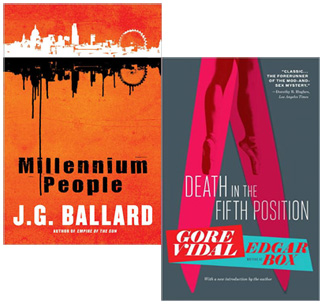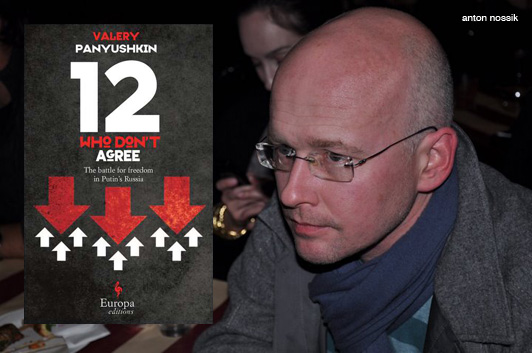Read This: Ballard to Box
 I’ve had a couple of new posts up at some of the other websites I write for. Over at Shelf Awareness, I consider Millennium People, a novel by the late J.G. Ballard that was published nearly a decade ago in the United Kingdom but is just now turning up in the United States (one of two posthumous works that W.W. Norton will release, along with paperback reprints of some of his earlier classics). This novel is very much of a kind with the other stories Ballard was writing in the late 1990s and early 2000s, Cocaine Nights and Super-Cannes; like them, as I discuss in the review, Millennium People is about “an outsider who discovers the sinister underbelly of a seemingly ideal, prosperous community.” In this case, it’s a psychologist who is lured into a cell of radical nihilists recruited from the middle classes. If you’ve read those other books, this story can be something of a retread, and in any event Ballard’s detached, clinical tone is not for every reader. (Imagine, let’s say, a colder, less engaging version of Fight Club.) Still, there’s a lot to chew on here, even if you don’t find yourself sharing Ballard’s preoccupations with what he considered the pathological aspects of our contemporary society.
I’ve had a couple of new posts up at some of the other websites I write for. Over at Shelf Awareness, I consider Millennium People, a novel by the late J.G. Ballard that was published nearly a decade ago in the United Kingdom but is just now turning up in the United States (one of two posthumous works that W.W. Norton will release, along with paperback reprints of some of his earlier classics). This novel is very much of a kind with the other stories Ballard was writing in the late 1990s and early 2000s, Cocaine Nights and Super-Cannes; like them, as I discuss in the review, Millennium People is about “an outsider who discovers the sinister underbelly of a seemingly ideal, prosperous community.” In this case, it’s a psychologist who is lured into a cell of radical nihilists recruited from the middle classes. If you’ve read those other books, this story can be something of a retread, and in any event Ballard’s detached, clinical tone is not for every reader. (Imagine, let’s say, a colder, less engaging version of Fight Club.) Still, there’s a lot to chew on here, even if you don’t find yourself sharing Ballard’s preoccupations with what he considered the pathological aspects of our contemporary society.
I also made my debut at Criminal Element, the new mystery/thriller fansite from Macmillan (the same folks who produce Heroes & Heartbreakers and, in a different office, Tor.com). I decided to write about the reissued editions of three novels Gore Vidal wrote in the 1950s using the pseudonym Edgar Box—a workaround for the lost sales he was experiencing with his own fiction when The New York Times refused to review any of his books, because one critic was offended by his matter-of-fact treatment of homosexuality in The City and the Pillar. (That’s how Vidal frames the situation, anyway; subsequent research led me to conclude that some details were exaggerated.) Starting with Death in the Fifth Position and then with Death Before Bedtime and Death Likes It Hot, Edgar Box worked a fairly conventional mystery plot—throw a clever fellow in with a bunch of bitchy people, one of whom dies early on—and gave it a dose of suave 1950s cynicism. Don’t get me wrong: Peter Sargeant, Box’s public relations man and occasional amateur sleuth, is no beatnik. He’s more the kind of guy who knows that the social conventions are one big racket, but he still likes the perks. (Also the kind of guy who, this being the 1950s and all, would make witty cracks about the Kinsey Report while trying to score with a woman.) The series got off to a good start, although the formula wears a bit thin in Death Likes It Hot. Then again, you probably shouldn’t read all three of them in a row, the way I did…
And then there’s this week’s post for Character Approved, where I talk about the literary magazine Little Star, which published its second issue a few months back (available online!). And be sure to check out the Little Star blog, which is always pointing to something interesting from the world of serious literature.
9 July 2011 | read this |
Read This: Character Approved for Summer

Earlier this week, I started writing for the USA cable network’s Character Approved blog, which “celebrates the people, places and things that are making a mark by positively influencing our cultural landscape,” basically serving as a literary correspondent—a role I inherited from Ann Kingman, one of the founders of the excellent Books on the Nightstand site. Every week, I’ll be focusing on a book, or an author, or a publisher, maybe even a super-zealous librarian; if I think it’s changing the world of literature for the better, I’m going to do what I can to share it with readers, just as I’ve been doing here, only reaching out to a different audience.
I started out with a list of summer reading recommendations, which ranges from Those Guys Have All the Fun, a marvelously thick oral history of ESPN as far back as the pre-launch fundraising and as recent LeBron’s “Decision,” to 12 Who Don’t Agree, in which Russian journalist Valery Panyushkin talks to participants in a 2007 protest against Vladimir Putin’s government to create a group portrait of what a progressive movement really looks like at street level. Plus three other amazing books I think folks are going to love… some of which I’ll almost certainly be talking about here, too, in some context. We shall see!
30 June 2011 | read this |

 Our Endless and Proper Work is my new book with Belt Publishing about starting (and sticking to) a productive writing practice.
Our Endless and Proper Work is my new book with Belt Publishing about starting (and sticking to) a productive writing practice. 
